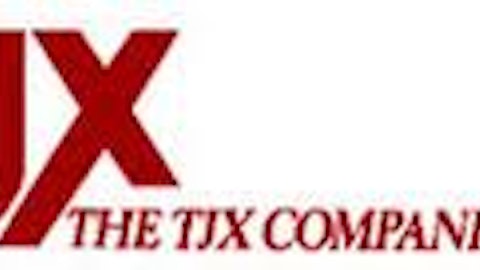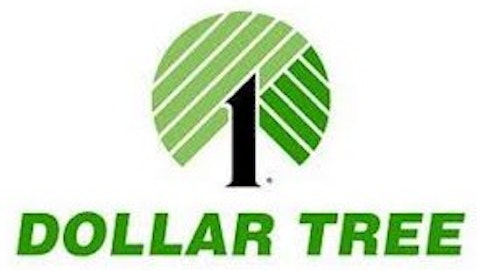A hidden money tree
That brings us to the hidden threat to lower-end department stores like Sears and superstores like Target – dollar stores. Over the past few years, dollar stores have been evolving from lower-end thrift stores into full-service discount superstores. Companies such as
Dollar Tree, Inc. (NASDAQ:DLTR), Dollar General Corp. (NYSE:DG) and Family Dollar Stores, Inc. (NYSE:FDO) have started carrying more fresh food, name brand household items, and cigarettes with the intended goal of stealing market share from Target Corporation (NYSE:TGT), Wal-Mart Stores, Inc. (NYSE:WMT) and Costco Wholesale Corporation (NASDAQ:COST). These dollar stores are also positioning themselves closer to lower-income neighborhoods, where fuel costs are a major concern. Lower-income shoppers are more likely to shop at closer stores if the products and prices are comparable to Wal-Mart Stores, Inc. (NYSE:WMT) or Target.
The strength of this strategy shines through with Dollar Tree, Inc. (NASDAQ:DLTR), which I consider to be the strongest company in the industry. Dollar Tree recently reported first quarter earnings of $0.60 per share, or $133.5 million, up from $0.50 per share, or $116.1 million, a year earlier. This topped the analyst forecast by three cents. Revenue also climbed 8.3% to $1.87 billion, meeting the consensus estimate. Same-store sales increased 2.1%.

Dollar Tree, Inc. (NASDAQ:DLTR) is also expanding aggressively, opening 94 stores during the quarter. Its stores are also getting bigger, with the square footage of locations rising 7% year-on-year to 41.2 million total square feet. I firmly believe that Dollar Tree’s strategy to ramp up the pressure against discount superstores will work, as seen with its strong top and bottom-line growth and rising same-store sales.
The Foolish bottom line
In conclusion, let’s compare the fundamentals of these three retailers to see if my opinions are justified.
Forward P/E | Price to Sales (ttm) | Return on Equity (ttm) | Debt to Equity | Profit Margin | Qty. EPS Growth (y-o-y) | Qty. Rev. Growth (y-o-y) | |
Sears Holdings | N/A | 0.16 | -28.06% | 98.36 | -2.33% | N/A | 1.80% |
Target | 12.40 | 0.60 | 18.52% | 106.58 | 4.09% | -2.00% | 6.80% |
Dollar Tree | 15.64 | 1.47 | 41.12% | 16.27 | 8.38% | 21.70% | 15.40% |
Advantage | Target | Sears | Dollar Tree | Dollar Tree | Dollar Tree | Dollar Tree | Dollar Tree |
Source: Yahoo Finance, 5/24/2013
While Target Corporation (NYSE:TGT) and Sears may look fundamentally cheaper at first glance, a look at the rest of these numbers show that Dollar Tree, Inc. (NASDAQ:DLTR), with lower debt, higher margins and double-digit top and bottom-line growth, would be a much better investment. In addition, if the economy crumbles again, Dollar Tree can thrive better in a recessionary environment than either Target or Sears.
The article Two Retailers to Sell and One to Buy originally appeared on Fool.com.
Leo is a member of The Motley Fool Blog Network — entries represent the personal opinion of the blogger and are not formally edited.
Copyright © 1995 – 2013 The Motley Fool, LLC. All rights reserved. The Motley Fool has a disclosure policy.


